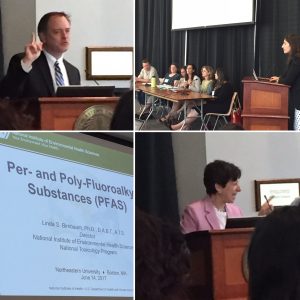Science and Citizens: Individuals Taking a Stand
 You may have noticed, if you follow us on Twitter or Instagram, that Protect Our Breasts is attending the Per- and Polyfluoroalkyl Substances (PFAS) Conference at Northeastern University in Boston. While the class of chemicals is a mouthful, its use in products fills our marketplace and ends up in our environment – particularly our drinking water. Months ago, we shared an article from Silent Spring Institute about these chemicals in fast food packaging. Periodically, we suggest you avoid Teflon pans, microwave popcorn liners and pizza boxes to steer clear. Yesterday, we learned some dental floss may be added to the list.
You may have noticed, if you follow us on Twitter or Instagram, that Protect Our Breasts is attending the Per- and Polyfluoroalkyl Substances (PFAS) Conference at Northeastern University in Boston. While the class of chemicals is a mouthful, its use in products fills our marketplace and ends up in our environment – particularly our drinking water. Months ago, we shared an article from Silent Spring Institute about these chemicals in fast food packaging. Periodically, we suggest you avoid Teflon pans, microwave popcorn liners and pizza boxes to steer clear. Yesterday, we learned some dental floss may be added to the list.
Protect Our Breasts shares tips with you to protect yourself from breast cancer later in life. All of those tips have an anchor in the science. At this conference, we have been brought up-to-date by Dr. Linda Birnbaum, Director of the NIEH, and scientists from Harvard, Ohio State, UMass-Lowell, West Virginia and others. Our research for Protect Our Boys was also updated as the link between PFAS and testicular cancer was made evident in a number of the presentations.
As grateful as we are for the updated science, the recurring theme throughout yesterday and maybe again today, seems to be the power of the individual taking a stand and never backing down. Individuals, from mothers to town managers, who unintentionally noticed the unusually high incidence of illness amongst their neighbors (particularly cancer), recognized the role of the chemical from a nearby military base, a corporate manufacturing plant, or their local landfill and began the slow arduous task of testing and fighting in court.
We heard from lawyer Rob Bilott, “DuPont’s Worst Neighbor” NYTimes 1/10/2016 who took on an environmental case of epic proportions that spanned many years. Ken Cook took to the podium to share the continuous role of the Environmental Working Group in this fight against PFAS (and other chemicals). Silent Spring Institute, Toxics Action Center and other groups have been mobilizing citizens and providing data for many years.
Yet, it seems the citizens – the ones who refuse to be ignored are our most important heroes in this battle over toxic chemicals. And so, I can’t help but think of our chapter ambassadors, sometimes alone at a table in a dining hall waiting to share this critical information with their peers or an executive board member who needs to get to class, but takes the time to finish that post on a chemical of concern – those personal decisions of tenacity, when others might give up. It is always the individuals, working together, who will make a difference in this world. To all of you taking a stand and not backing down, thank you for every thing you do!

